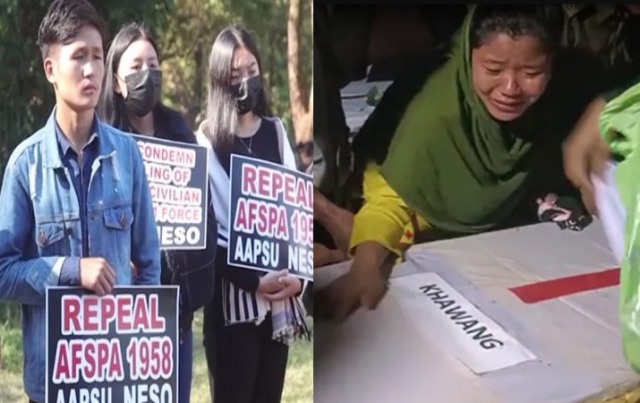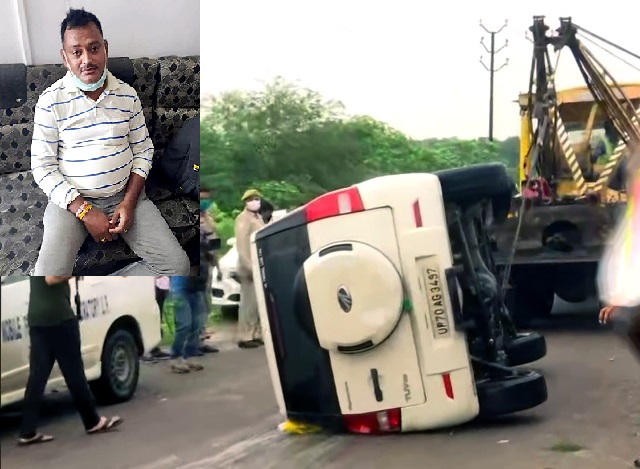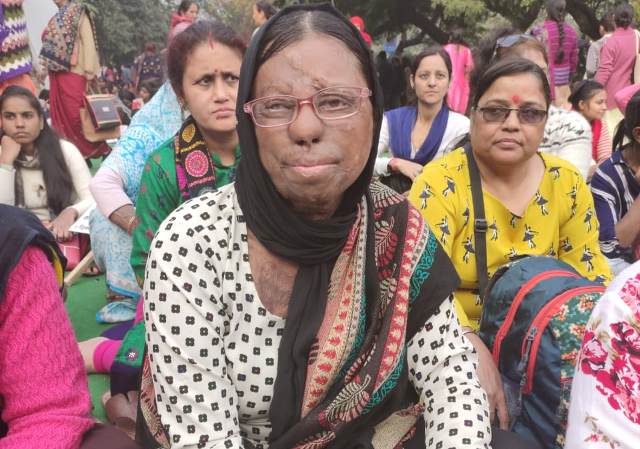Deep sadness stalks the pristine landscape. The simmering shadow of angst and anger lingers like a specter of death across the villages and towns of Nagaland with its simple, hardworking people in the distant North-east of India. The legendary Hornbill Festival, with its pulsating rhythms, collective joy and beautiful oral and folk traditions, will not happen this year. The people of Nagaland are in mourning.
As many as 13 innocent citizens were killed by the security forces in the Oting-Tiru area on December 4, and in Mon one day later, in indiscriminate firing by the Army. One jawan was also killed in the clash which followed with people protesting the Army ambush.
You should see the silent suffering of the parents, including the mother and father of the twin brothers, among the six coal miners, shot dead in cold blood, for no rhyme or reason. The mother and father sit hunched outside their homes, stupefied, their stoic faces telling yet another story of the predictable pattern repeated yet again in the Northeast, reminiscent of similar massacres and killings in the past.
The six coal miners were returning on a pick-up truck, on Saturday, perhaps singing, happy to go back home and be among their people on the weekend, looking forward to go to Sunday church next morning. Instead, their coffins were neatly lined up for burial, from earth to earth, life to death — and so meaningless, brutish, short and nasty.
Video images have reportedly emerged of the Army trying to allegedly shift the ‘hidden’ bodies in another truck covered with tarpaulin, after wrapping them up in plastic. If these reports are authentic, and which sources in the Nagaland Police are claiming so, then why should the Army be indulging in this terrible camouflage?
The Indian Express (December 6, 2021) has reported from Dibrugarh: “Direct marise… they shot right at us,” said Sheiwang, 23. He is among the only two survivors of the eight coal miners in Oting village. Six of his friends were killed. He has been shot on his elbow and chest and he is battling for life at the Assam Medical College and Hospital (AMCH) in Dibrugarh. Along with Yeihwang, 30, another survivor, now in a critical state, was shot near his ear. According to the report: “Union Home Minister Amit Shah in a statement in Rajya Sabha on Monday said the vehicle ‘was signaled to stop’ and was fired upon after it ‘tried to flee’. However, Sheiwang says: “We were not signaled to stop. They killed us directly. We were not trying to flee…we were just in the vehicle.”
The entire Naga society, civil society groups, the Naga Students’ Federation, political parties, the state government, have demanded that the draconian Armed Forces Special Powers Act-1958 (AFSPA), first enacted by the British, should go. This has been a universal demand across the country since long, but most regimes have refused to scrap AFSPA, except the Left-led government of Tripura, with Manik Sarkar at the helm. Under the Act, the Army can shoot and arrest, and they have total impunity.
ALSO READ: Exhuming Extra-Judicial Deaths In Punjab
Over the decades, cold-blooded massacres and killings have become a method in the madness in the Northeast, but justice has eluded the people, despite huge public protests. The blood of innocents has been relentlessly spilled — what happened in Nagaland is nothing but a chronicle of a tale foretold.
Manipur, in the neighbourhod, has had its own litany of tragedy and injustice. Indeed, the lines of control of the so-called ‘disturbed areas’ where AFSPA has been enacted, are etched as lines of infinite sorrow in the hearts and soul of the people.
Extra-judicial killings had become rampant in Manipur earlier. The Mint, (August 1, 2018), reported: “A two-judge bench of the apex court on 27 July pulled up CBI for delays in investigating extrajudicial killings in Manipur and in filing of charges. On 30 July, Justice MB Lokur and Justice UU Lalit hammered home the point when they summoned CBI director Alok Verma… There is reason for the court’s impatience. The hearings are on account of a PIL by the Extra Judicial Execution Victim Families Association, Manipur, and the Imphal-based Human Rights Alert (HRA), a watchdog. The PIL alleged 1,528 extrajudicial killings between 1980 and 2011. The allegations were against the Indian Army, its adjunct Assam Rifles, several central paramilitary forces, and the Manipur Police. While police are not protected by the immunity-and-impunity provisions of the Armed Forces (Special Powers) Act, 1958, they piggy-backed on the practice of security forces to conduct their own campaigns of… intimidation…” In July 2017, a Supreme Court bench also brushed aside the adequacy of claims by the government that compensation had been paid to families of the victims. The court underscored its own observation from 2015: “Now it’s like you kill 10 people, pay compensation and the matter ends there…”
In the picturesque mountain village of Malom in Manipur, amidst undulating meadows of the magical Imphal valley, across the rice fields and pristine ponds, a silent memorial tells its own sad story, with the names of the dead, young and old, all innocent, etched forever as a testimony of Army atrocities. Infamously remembered as the ‘Malom Massacre’, 10 locals, including a national bravery award winner, were shot dead by the 17 Assam Rifles on November 2, 2000 here. This massacre triggered the 16-year long Gandhian fast and satyagraha of Irom Sharmila, with iron in her soul, a nasal pipe for forcible liquid transmission in her nose, condemned as a prisoner for years.

As her fast in custody, drawing global attention, entered its 15th year, this reporter met her on November 5, 2015 in Imphal. In her one-room ‘cell’, with solidarity messages and newspaper clippings on the wall, including a letter by Nelson Mandela, surrounded by books, including one by Gabriel Garcia Marquez, she had said, “How can nations call themselves advanced or civilised if they practice, sanction and legitimise organized barbarism in the name of law and order? Why can’t they repeal AFSPA if they know so well that it is completely inhuman, anti-democratic, brutal, and irrational; that, it has led to mass insecurity, relentless tragedies, angst and injustice in Manipur and Kashmir; that it has led to the armed forces going berserk without accountability and with absolute impunity? I am fighting for reason and humanity. My struggle is peaceful. Why should the armed forces be allowed to kill and torture and get away? Why are we treated differently from the rest of India?”
Indeed, while her protest continued, so did the peaceful vigil with candles of the ‘Mothers of Manipur’, night and day, even as the entire civil society, sat on fasts in solidarity with Sharmila. The mothers have been a rock in the protracted struggle against AFSPA. And it is they who shook the national conscience yet again, and with such amazing power and raw force, on July 15, 2004, outside the Kangla Fort in Imphal, then the Assam Rifle headquarters.
On that historic day, 12 of the mothers stripped themselves totally naked outside the Fort with banners saying: ‘Indian Army Rape Us’ and ‘Indian Army Take Our Flesh’. They were protesting the murder of of Manorama Thangjam, 32, who was picked up by the men of Assam Rifles four days earlier, and then, assaulted and killed most brutally.
Manorama’s bullet-riddled body was later discovered near a paddy field. There were gun shots on her private parts and thighs — clearly, with an intent to camouflage the sexual assault. This was the height of injustice and impunity, and this was simply unacceptable anymore. That is why, the mothers stripped themselves naked outside the Assam Rifles headquarters.
This reporter visited the poor home of Manorama surrounded by dense foliage outside East Imphal in November, 2015. Her mother was still heart-broken, remembering how she was picked up by the soldiers with such brute force, and for no reason whatsoever. That nightmare, as a dark and cruel memory of a night of terror, continues to haunt the Manipuri mothers till this day.
And, yet, AFSPA remains. And so does the nightmare.


